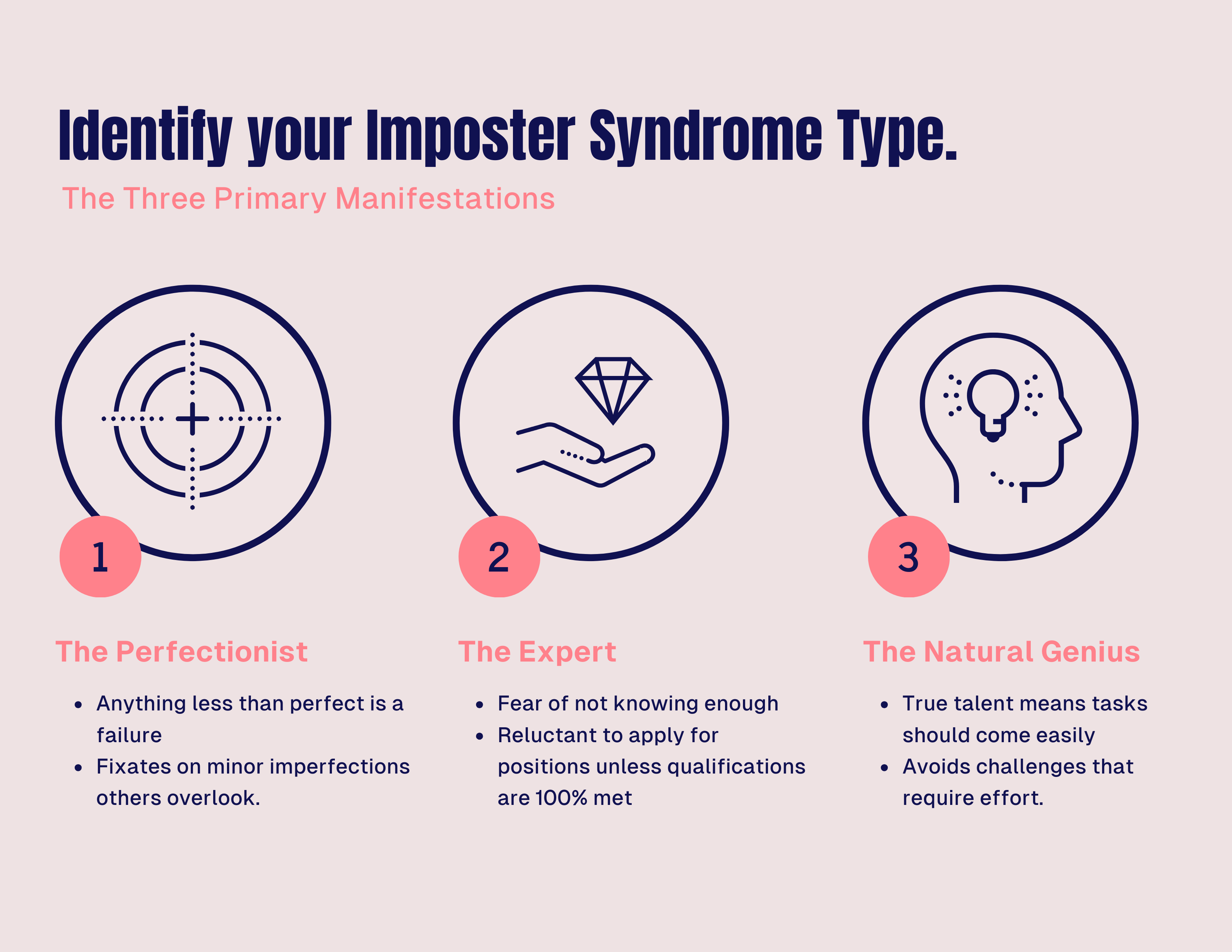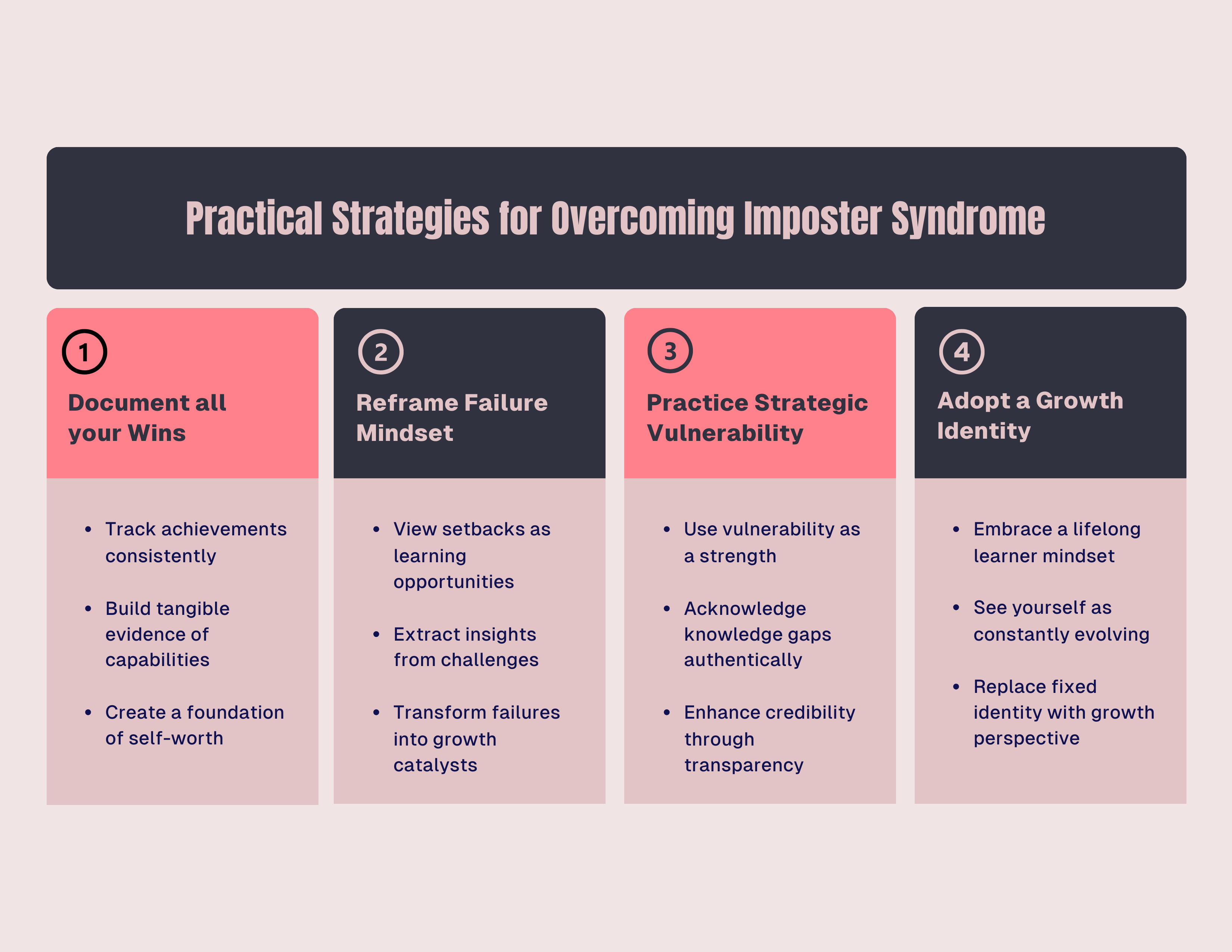ALorem ipsum dolor sit amet, consectetur adipiscing elit. Maecenas eu porta tellus. Mauris sit amet efficitur velit, vitae mollis ipsum. Cras a facilisis sem, vulputate accumsan diam. Praesent molestie, mauris nec dictum condimentum, sem metus lobortis orci, vitae auctor nunc ante et nunc. Phasellus dui ligula, hendrerit eget urna sed, porttitor sagittis libero. Nam tempor felis quis erat imperdiet pulvinar. Aenean euismod vitae nibh eu pretium. Cras quis elementum risus, nec ultrices felis. Nulla aliquet elementum erat et finibus. Quisque aliquam quam ultrices nibh congue sollicitudin
Have you ever sat in a meeting, surrounded by colleagues, feeling like you're the only one who doesn't belong? Or perhaps you've received praise for your work while secretly thinking, "If they only knew I was just winging it..." That persistent feeling that you're a fraud about to be exposed isn't unique to you. It's called imposter syndrome, and it affects even the most accomplished professionals.
Professionals at WCFC Academy have worked with hundreds of high-achieving individuals who, despite their impressive credentials and consistent results, still feel like they've somehow fooled everyone. This disconnect between external success and internal self-perception isn't just uncomfortable. It can actively sabotage your career growth and wellbeing.
The most damaging form of self-sabotage isn't failure – it's the inability to acknowledge and own your success.
Let's explore why imposter syndrome happens and, more importantly, how you can overcome it to achieve authentic confidence in your professional journey.
Understanding where imposter syndrome comes from is the first step toward dismantling it. Contrary to popular belief, it's not simply a symptom of low self-esteem. Quite often it’s the opposite.
Common origins include:
This isn't just psychological theory – neurologically, imposter syndrome activates your brain's amygdala, triggering the same threat responses as physical danger. This explains why logic alone often fails to resolve these feelings.
Imposter syndrome doesn't look the same for everyone. Recognising your particular pattern is crucial for developing targeted strategies to overcome it.

What it looks like:
The underlying belief: "If I were really competent, this would be effortless and flawless."
What it looks like:
The underlying belief: "There's always more I should know before I can claim expertise."
What it looks like:
The underlying belief: "If I were truly talented, this would come naturally to me."
The above tendencies often leads to burnout when unrealistic standards become unsustainable over time. When nothing ever feels good enough, mental and physical exhaustion inevitably follow. Learn more in our article on 5 Signs You're Experiencing Burnout.
Awareness alone isn't enough. You need practical strategies to rewrite these deeply ingrained patterns. Here are research-backed approaches that have helped our clients transform self-doubt into authentic confidence.

Create a 'success inventory' where you record accomplishments, positive feedback, and challenges overcome. This isn't about ego. It's about creating objective evidence that counters your subjective feelings of inadequacy. Document your wins and achievements regularly - this not only counters imposter syndrome but also provides valuable material for your professional documents. See our guide on Creating an Effective Resume for more guidance on translating these achievements into compelling professional narratives.
Start seeing mistakes as data points rather than character indictments. After any setback, ask yourself: "What did this experience teach me? How has this prepared me for future challenges?" This shifts your focus from perceived inadequacy to continuous growth.
Contrary to what imposter syndrome tells you, acknowledging limitations doesn't expose you as a fraud. It demonstrates self-awareness and authenticity. Try saying "I'm still learning about this aspect" rather than pretending to know everything. You'll be surprised how this actually increases others' confidence in you.
Rather than seeing yourself as either competent or incompetent with a fixed mindset, start identifying as someone who consistently develops with a growth mindset. This subtle shift allows you to embrace challenges as opportunities rather than threats to your professional identity.
Overcoming imposter syndrome isn't about eliminating self-doubt entirely. It's about preventing those doubts from dictating your actions. As you implement these strategies, you'll notice your relationship with uncertainty shifting. The voice of doubt may still occasionally whisper, but it no longer controls your professional decisions.
The most successful professionals aren't those who never experience imposter syndrome. They're the ones who have learned to acknowledge those feelings without being derailed by them. They understand that confidence isn't the absence of doubt, but rather the ability to act despite it.
At WCFC Academy, we've developed frameworks that help ambitious professionals transform their relationship with imposter syndrome. Through strength-based coaching and proven methodologies, we guide you to discover your authentic professional identity – one that embraces both your capabilities and your continuous evolution.
Ready to break free from the constraints of imposter syndrome? Take the first step today with our free Gallup StrengthsFinder Assessment. Understanding your innate strengths provides the foundation for authentic confidence that no inner critic can shake. Let’s get to building unshakable professional confidence now.
“Raesent molestie, mauris nec dictum condimentum, sem metus lobortis orci, vitae auctor nunc ante et nunc ligula”



Your potential is infinite. Our mission is to activate and unleash it in the right environment.